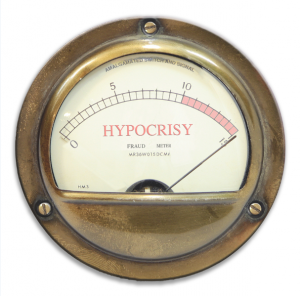“Wounds from a friend can be trusted, but an enemy multiplies kisses.” (Proverbs 27:6)
First things first: I’m not anti-Christian and the “Law” in the title is referring to God’s law. If you’re disappointed though, please stick around.
In the online Merriam Webster’s dictionary hypocrisy is defined as “the behavior of people who do things that they tell other people not to do: behavior that does not agree with what someone claims to believe or feel.” Another definition found online puts it this way: “the practice of claiming to have moral standards or beliefs to which one’s own behavior does not conform; pretense.”
I think a hypocrite is simply someone who lets others know that they should behave a certain way, whether they do this directly or indirectly (even if they only “virtue signal”, in effect saying “this is right and I am right… you should be right to… like me!”), but then does the opposite themselves. For example, I’m guessing Fox news anchor Megyn Kelly is thinking twice about the kinds of photo shoots she will do in the future (see here).*
So I suggest the first definition, as well as mine, comports more closely with how most persons in the West have traditionally understood this word.** The second definition seems lacking to me in that it implies that if one’s behavior does not conform to one’s stated standards or beliefs, one cannot, in any sense, actually hold or want to hold those standards or beliefs (hence, “pretense”).
On the contrary, I suggest that we not only can do this, but that we all do. All persons sometimes act like hypocrites (even if it seems the elite world usually only detects this in more traditional folks who are vocal about their standards and beliefs – see * below for more). Better: all persons act hypocritically because all persons, even Christians, are sinners, infected with the venom of Satan’s lie (if you think I am projecting this because I, as a father of five 3-13 year-old boys, can’t fail to be well acquainted with my own hypocrisy, I consider but ultimately reject your point).
 Therefore, when popular Lutheran pastor Jonathan Fisk says, in a recent You Tube video, that:
Therefore, when popular Lutheran pastor Jonathan Fisk says, in a recent You Tube video, that:
“…it is only the hypocrite who would hear such good news about the forgiveness of sins [in Jesus Christ] and say ‘Thank goodness! I am now free to be as evil as I want ; I can throw away God’s law.’”
…I know what he is getting at, but, on the other hand, Satan’s temptations are never quite that crass, right?
I teach a beginning Christianity class online at the university level. Not long ago, one of my students, a theologically astute and fine Christian women judging from all available evidences, privately shared the following with me (now shared with permission):
“I want to talk about [what Philip Yancey says in his book What’s So Amazing about Grace] on page 184. “But why don’t I just go ahead and do it anyway? I can always get forgiveness later.” This is powerful because when I sin I know that it’s wrong before and during the act…yet I do it anyway. This is tough because I know that God will forgive but I’m sure He must get annoyed when I constantly commit the same sin and keep coming back to Him with guilt.”
I took that to be some serious and authentic stuff. And yes, I understand if some reading this might wonder whether or not a Christian can talk this way! Consider, however, that there is big difference between telling God “I will not!”, on the one hand, and feeling utterly overwhelmed by one’s passions and ingrained habits, on the other.
Here I how I responded to her:
Yes – [this] is bracingly honest. Even believers, can, and do, abuse grace (in spite of the Apostle Paul’s heartfelt cry “may it never be!”).
First of all, let me say that you don’t need to be concerned about God forgiving you only reluctantly. He urges us to forgive seventy-times seven because He does the same! His mercies are new every morning! He remembers our sins no more! He buries them in the ocean forever! The blood and righteousness of His Son avails for sinners!

Second, the Bible does tell us that there is a worldly sorrow that is not in line with true repentance: “Godly sorrow brings repentance that leads to salvation and leaves no regret, but worldly sorrow brings death” (I Cor. 7). This kind of remorse does not look to Christ, but elsewhere – or perhaps to a Christ of its own making (I Cor. 11). But to say all this does not mean that Christians – those who bear the fruits of true repentance (godly sorrow) – will not struggle with sin in the way you describe… See Romans 7, for example!
And the Apostle Peter tells us that we are to live “As free, yet not using liberty as a cloak for vice, but as bondservants of God.” (I Peter 2:16)
A Lutheran theologian by the name of Adolph Köberle said:
“…unrestrained roving thoughts never remain confined to the hidden chambers of the soul, but they crowd out into the open and display themselves in words and actions, that enslave, burden and shape the future of their author…”
I especially like what Yancey says in that book a few pages earlier than the quote you mention:
“Forgiveness is our problem, not God’s. What we have to go through to commit sin distances us from God – we change in the very act of rebellion – and there is no guarantee we will ever come back. You ask me about forgiveness now [as in: “Will God forgive me for what I’m about to do, namely leave my wife for another”], but will you even want it later, especially if it involves repentance?” (180)
Challenging words indeed! But he knows our struggle, and is ready to give us help in overcoming it – again, His mercies – and His humble and steady power – are new every morning. Here is another post I did on a related topic, which you might like. It talks about the effects of the actual sins [not just the original sin infection in our heart] we commit not only on ourselves, but also our neighbor as well! This is important, because the Christian is the person who is being increasingly transformed by God to show Christ-like concern for one’s neighbors. The Apostle Paul gives us a startling picture of what this looks like in Romans 9:1-5, as he mourns for those from whom he has come by blood, the Jewish people:
“I speak the truth in Christ—I am not lying, my conscience confirms it through the Holy Spirit— I have great sorrow and unceasing anguish in my heart. For I could wish that I myself were cursed and cut off from Christ for the sake of my people, those of my own race, the people of Israel. Theirs is the adoption to sonship; theirs the divine glory, the covenants, the receiving of the law, the temple worship and the promises. Theirs are the patriarchs, and from them is traced the human ancestry of the Messiah, who is God over all, forever praised! Amen.”
…I appreciate your honesty – I think many Christians feel the way that you do.
Back to the video mentioned earlier…

I would change the pastor’s statement “it is only a hypocrite who would hear…” to “only a person who is being hypocritical who would hear …” Why? Because I would not want there to be any chance I might give the impression that hypocrites like myself cannot be Christians – in fact, it is precisely because Christians remain hypocrites that we continue to need God’s law and gospel.
Pastor Fisk defines legalism as “trust in the law”, or believing that “the law has the power to regenerate fallen man into keeping it”. I think these are good definitions (though I would emphasize that the legalist believes he is saved by his law-keeping). He also goes on to say that the Gospel creates a love for the law without needing to remind the Christian of the law – and that this is something that “legalism never seems to believe”.
Given our fall into sin, I certainly agree with Pastor Fisk that the Gospel alone is able to create a love for the law of God. And I would also say that we do not need to be reminded of it – to a point.
Sometimes, after all, even if we have begun to know it (10 commandments and the like), it seems we don’t really know it as well as we should (it’s not quite “in our bones” as it should be!) and need to be reminded. Pastor Fisk, for example, goes on to do this himself in his video, pointing out that we continue to have a sinful nature (our “Old Adam”) that needs to be compelled and threatened daily to do the right thing. How is this done? By the Christian’s Spirit-driven new man, who is eager to love and wield the law to be who he is – and who he is growing to become more of – in Christ. Pastor Fisk calls this activity on the part of the Christian “the work of the law” – even as he is eager to add that this work is neither the “meaning of Christianity’s center” nor is it empowered by the law itself.
![Mock Him not! Blessed is everyone who takes refuge in Him! [Psalm 2:12]](https://infanttheology.files.wordpress.com/2015/05/christ.jpg?w=204)
I think he is certainly saying, given what he talks about here, that we sometimes do – even as he wants us to know that he is not a legalist who will never let the Gospel have the last word!*** So, perhaps we do need to be reminded of the law… insofar as its content is not deeply internalized in us?
For those however, who insist that we do not need to be reminded of God’s law, consider this: What is the Apostle Paul doing, for example, when he seemingly endeavors to guide, exhort, and encourage Christians in his letters with commands other than “believe the Gospel”?
If I even ask this question am I going back to legalism? Not letting persons rest in the Gospel? Not “getting the Gospel” myself?
May it never be!
None of this activity on Paul’s part means to say that the Gospel itself – the fact that Christ alone, grace alone, and faith alone frees us from sin, death, and the devil – is not the sole reason for the Christian to uphold the law of God, battle his sinful flesh, and to serve his neighbor.
On the contrary, it should be our only reason and motivation. It is only the Gospel that “fleshes out” for us the love of God – and can inspire us to say “Amen!” when we hear the beauty that is God’s law/will. In fact, with the Gospel ringing in our ears, the law can sometimes remind us of who we want to be – and who we have already begun to be in Christ.
FIN
For more thoughts on this see this post I did: The First Table of the Commandments’ Relationship to the Third Use of the Law.
Images: “Hypocrisy Meter, Pegged” by KAZ Vorpal. and “a hypocrite” by romana klee.
Notes:
*Rod Dreher has recently brought attention to an example of the unapologetic hypocrisy of the religious left here.
**Digging deeper of course, one finds that the word hypocrite comes from the Greek word hypokrites, which means “stage actor, pretender, dissembler.” So when Jesus uses the word he seems to be saying that a hypocrite is a person who pretends to be a certain way, but actually acts and believes in a contrary manner.
***Nowadays, might one be forgiven for having the impression he must be considered a legalist if he asserts, for example, that pastors are not simply “above reproach” by faith alone – but that the Apostle Paul truly means for them to have this and other qualities, before men, in order to qualify for the pastoral office?













